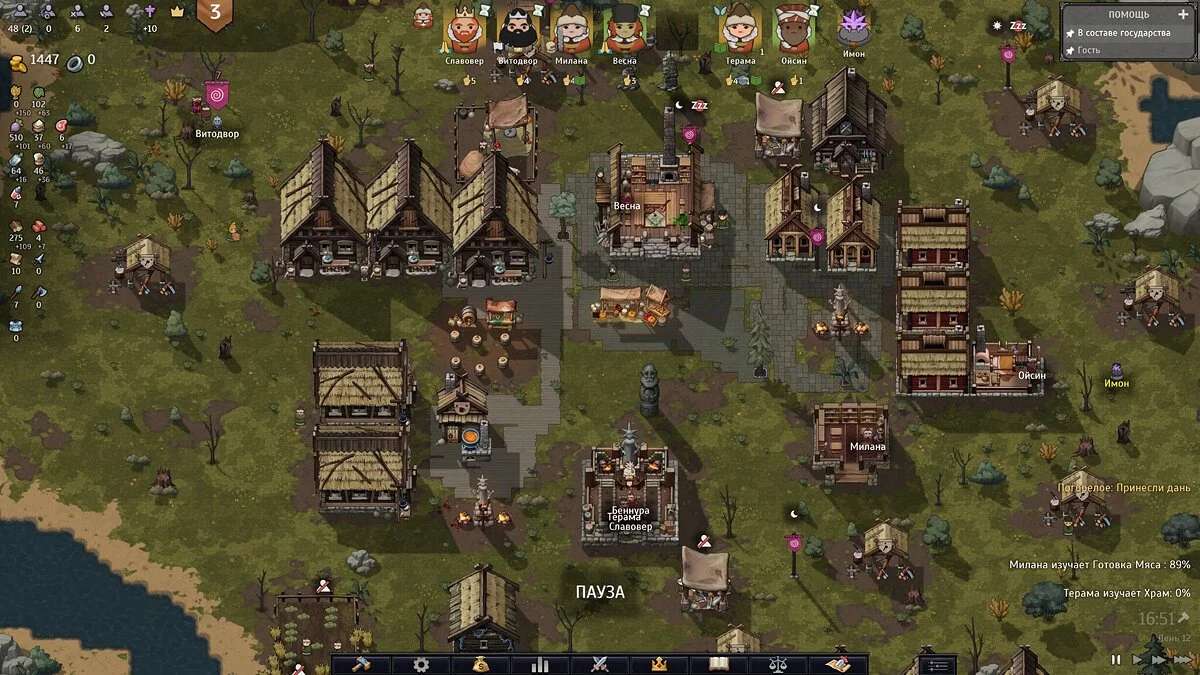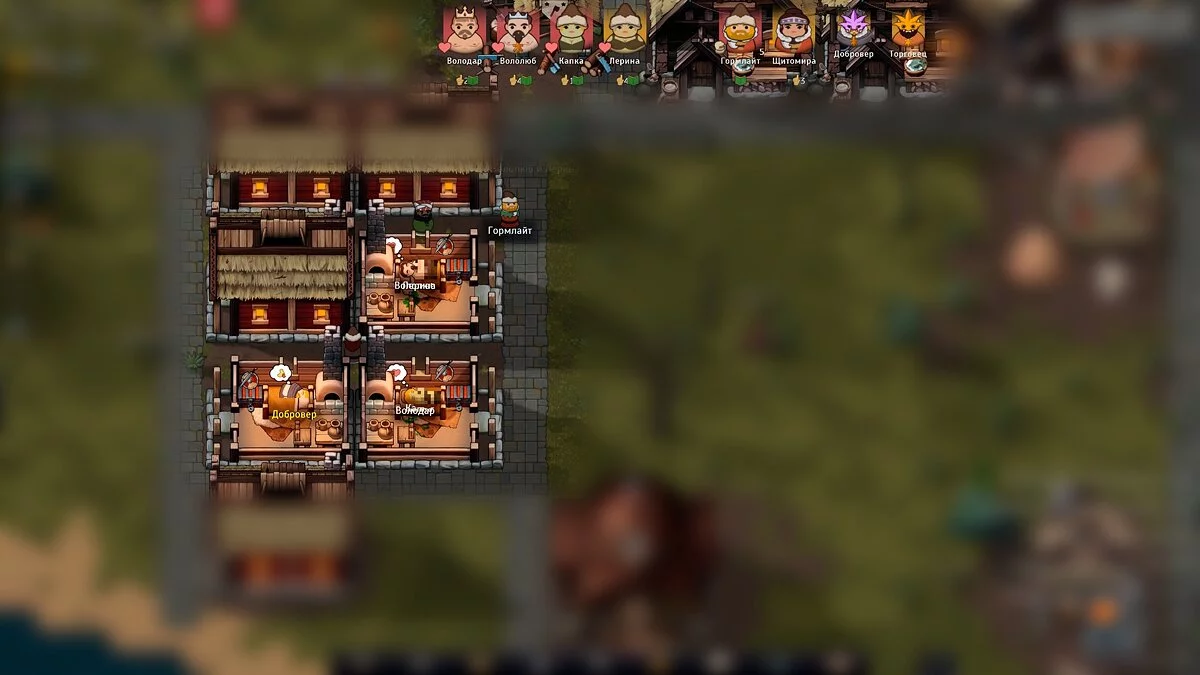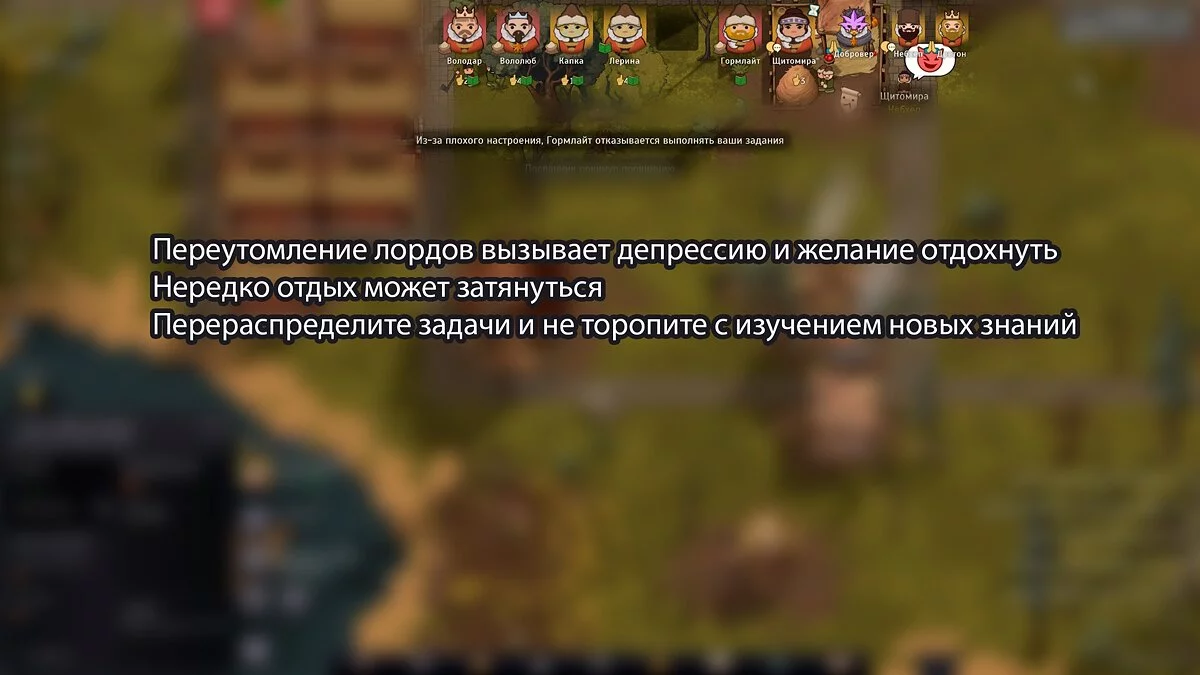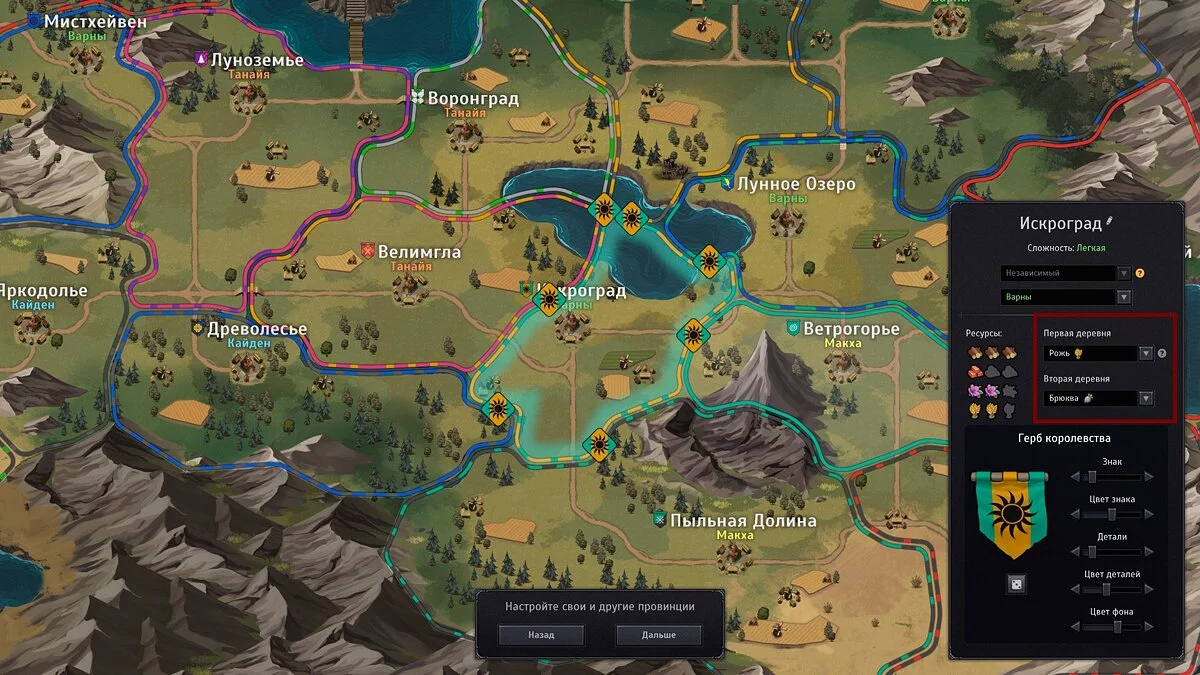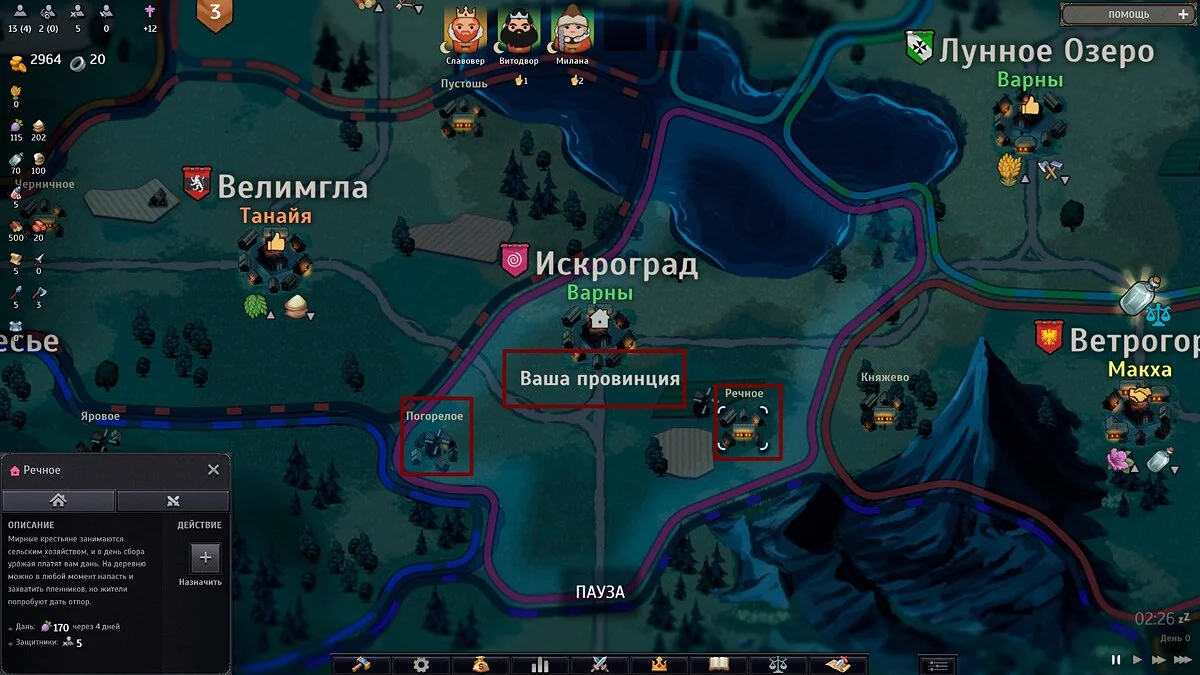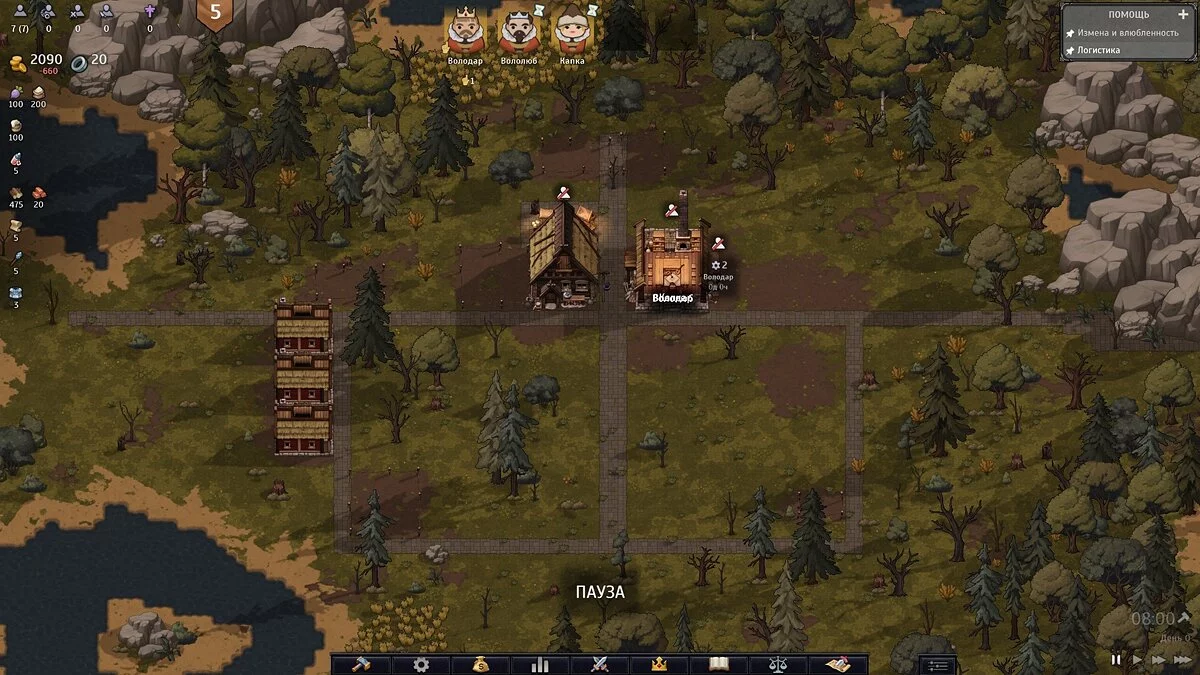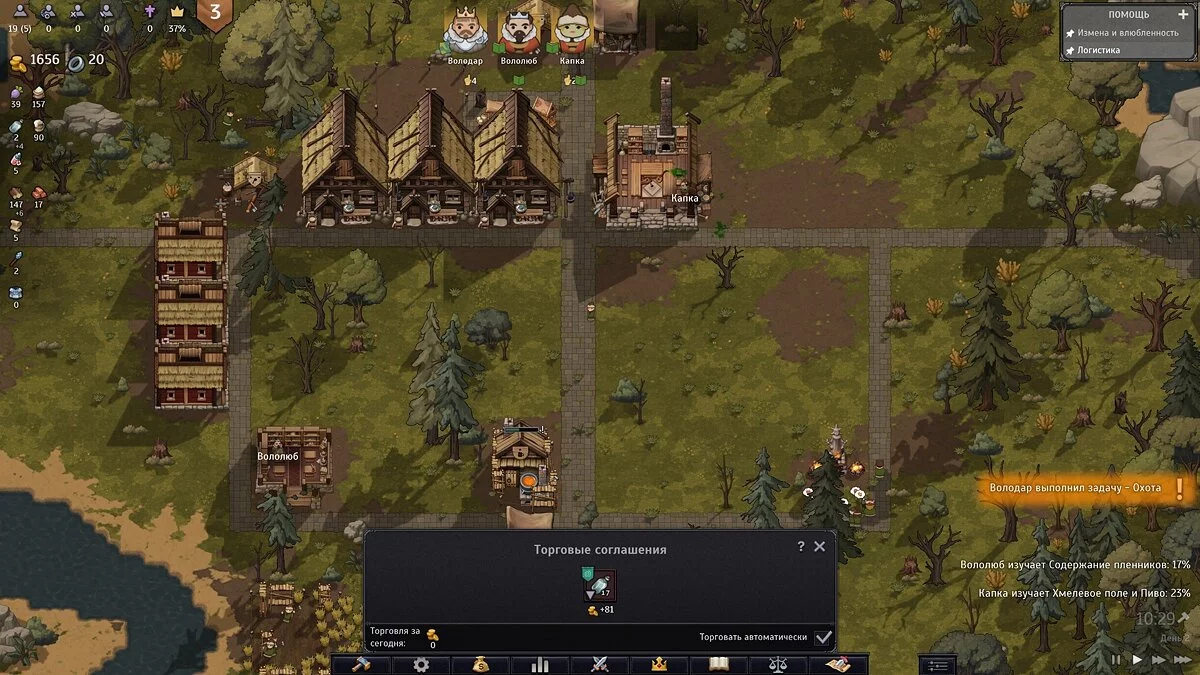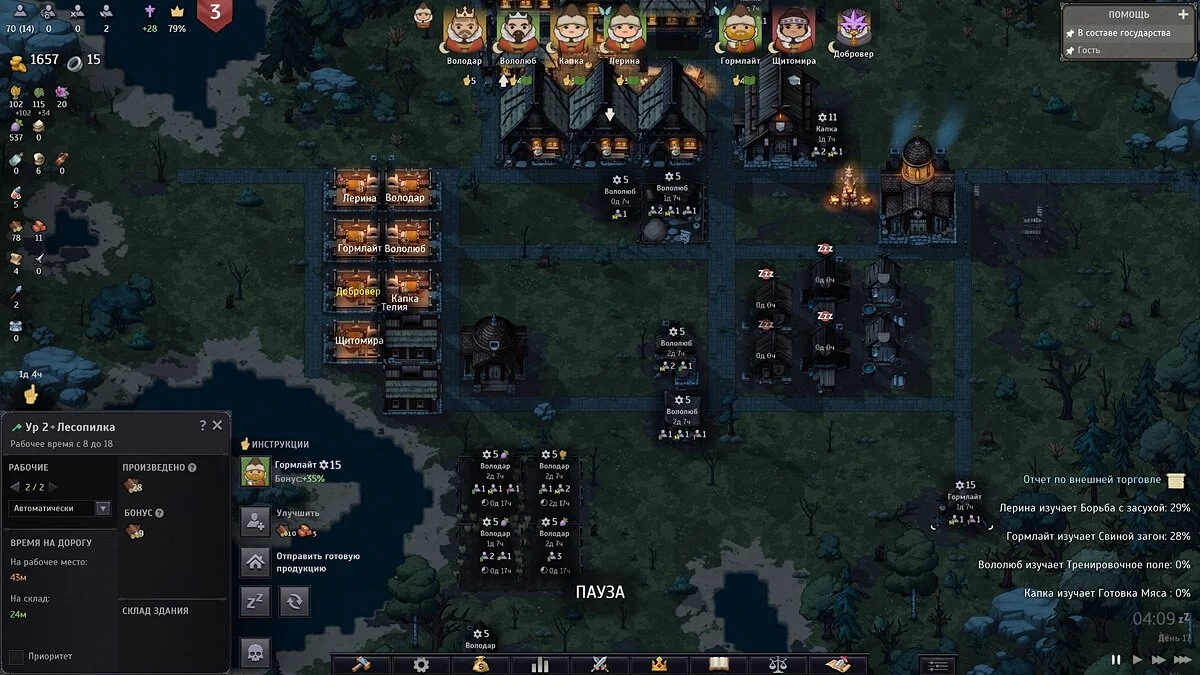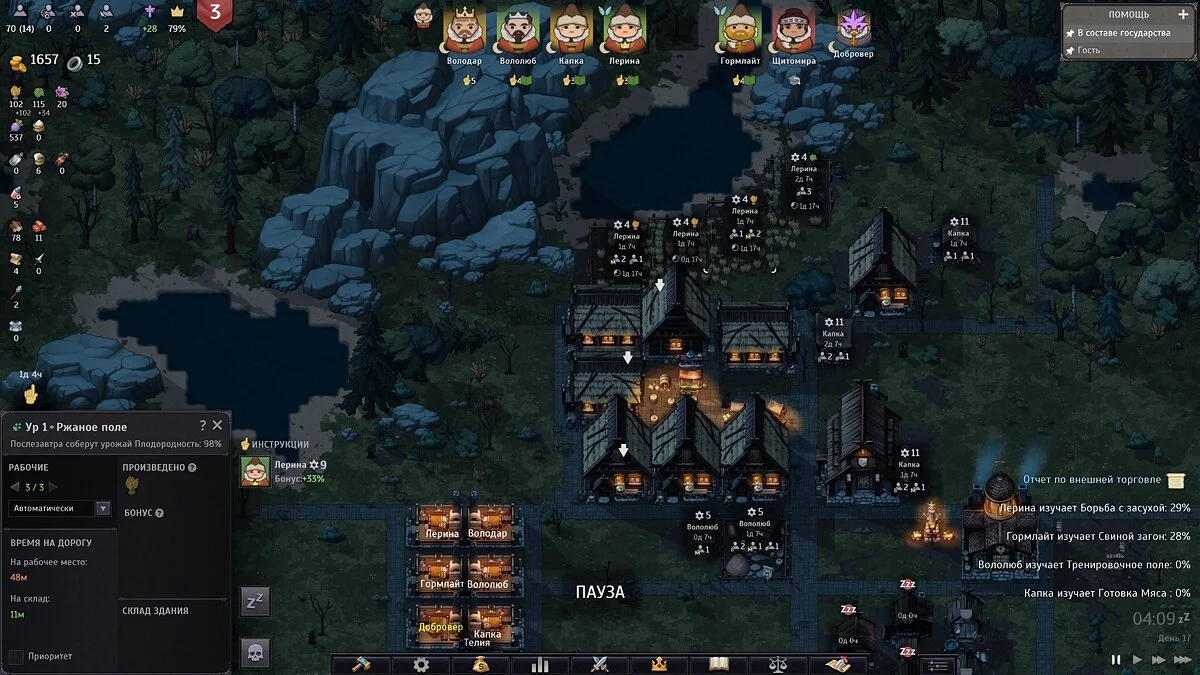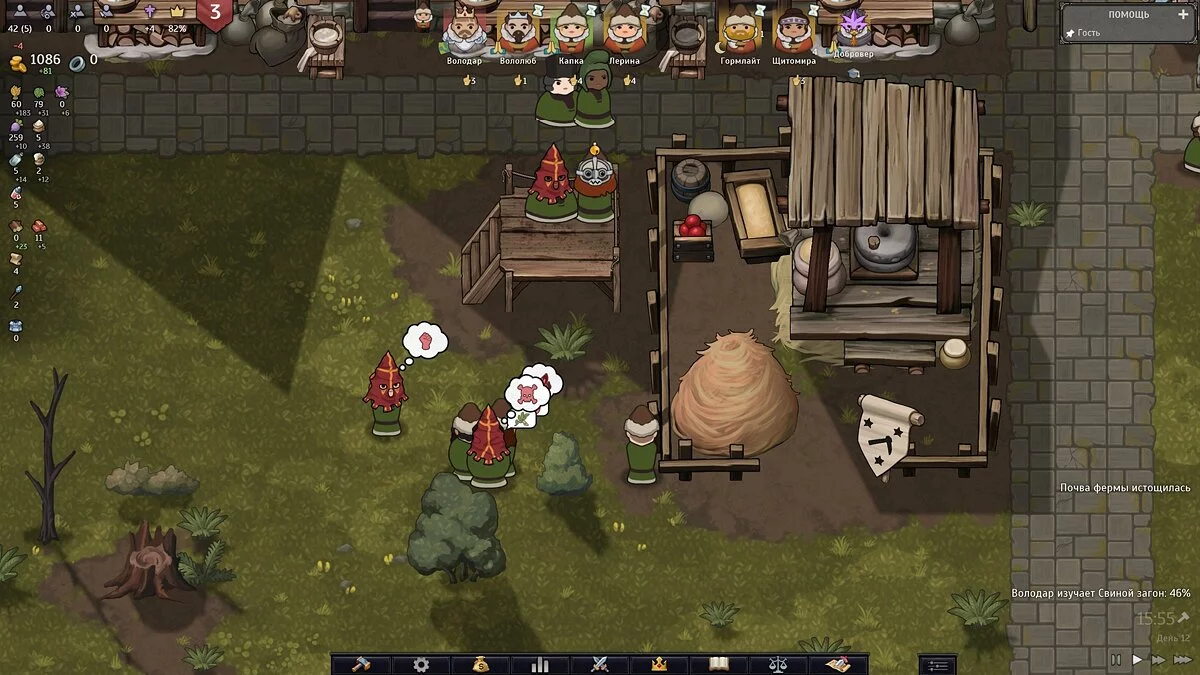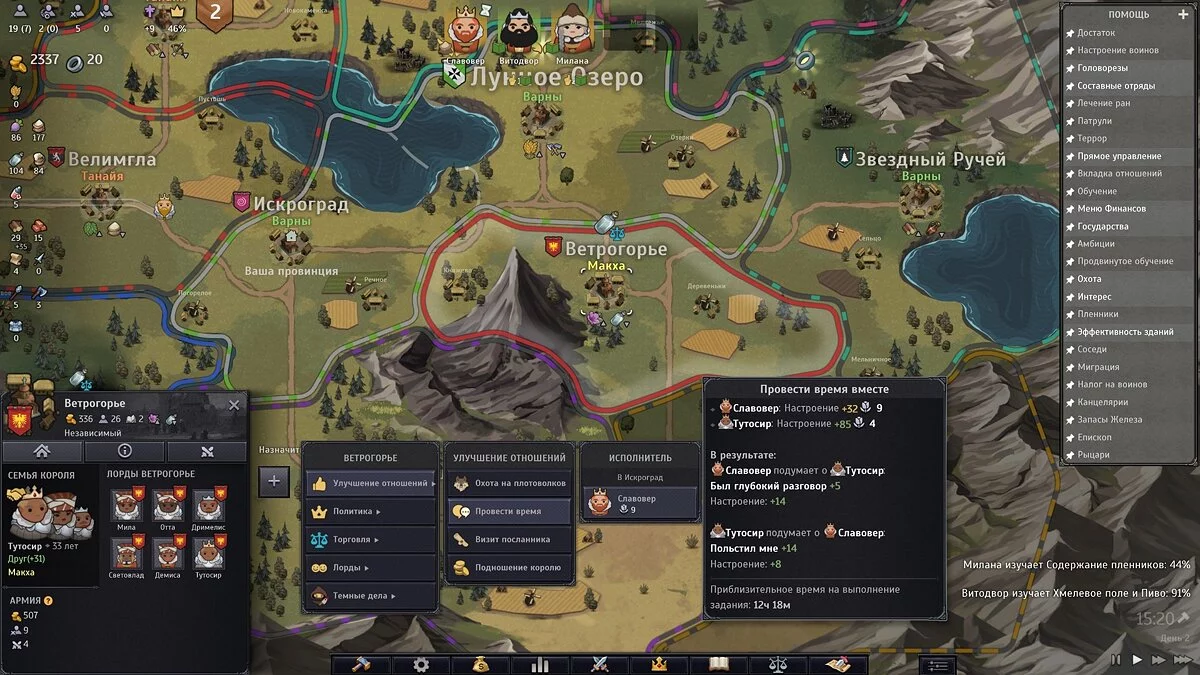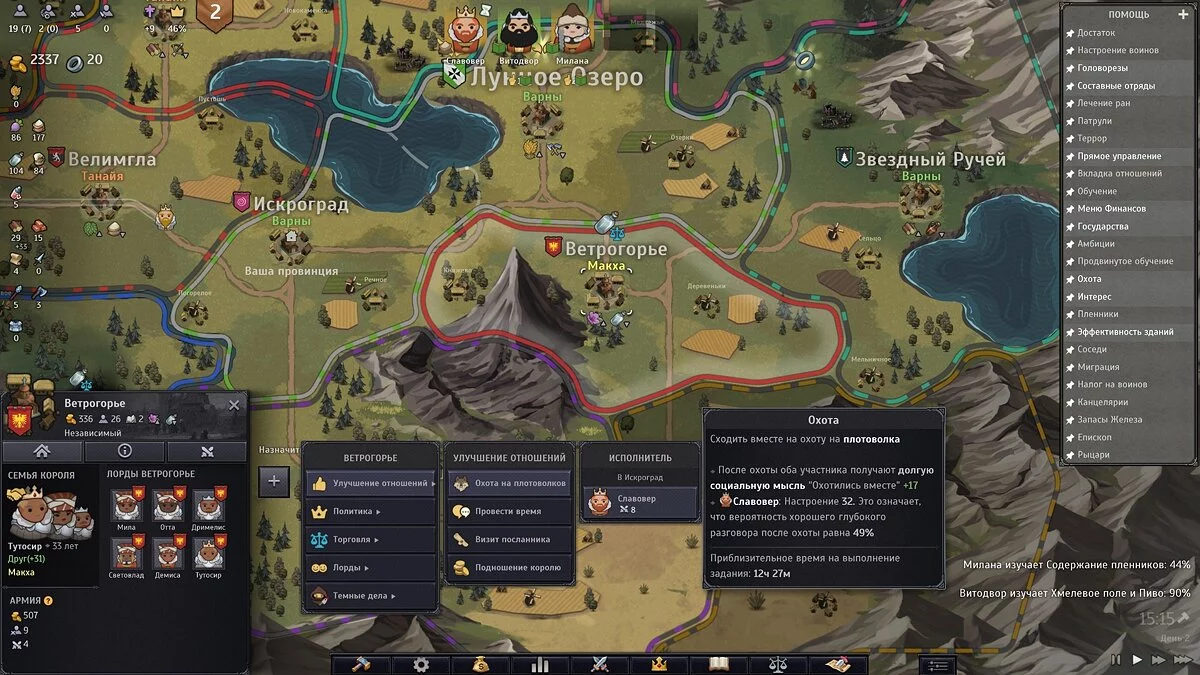Guide for Norland Beginners: Basic Features, Gameplay, and Game Creation Tips
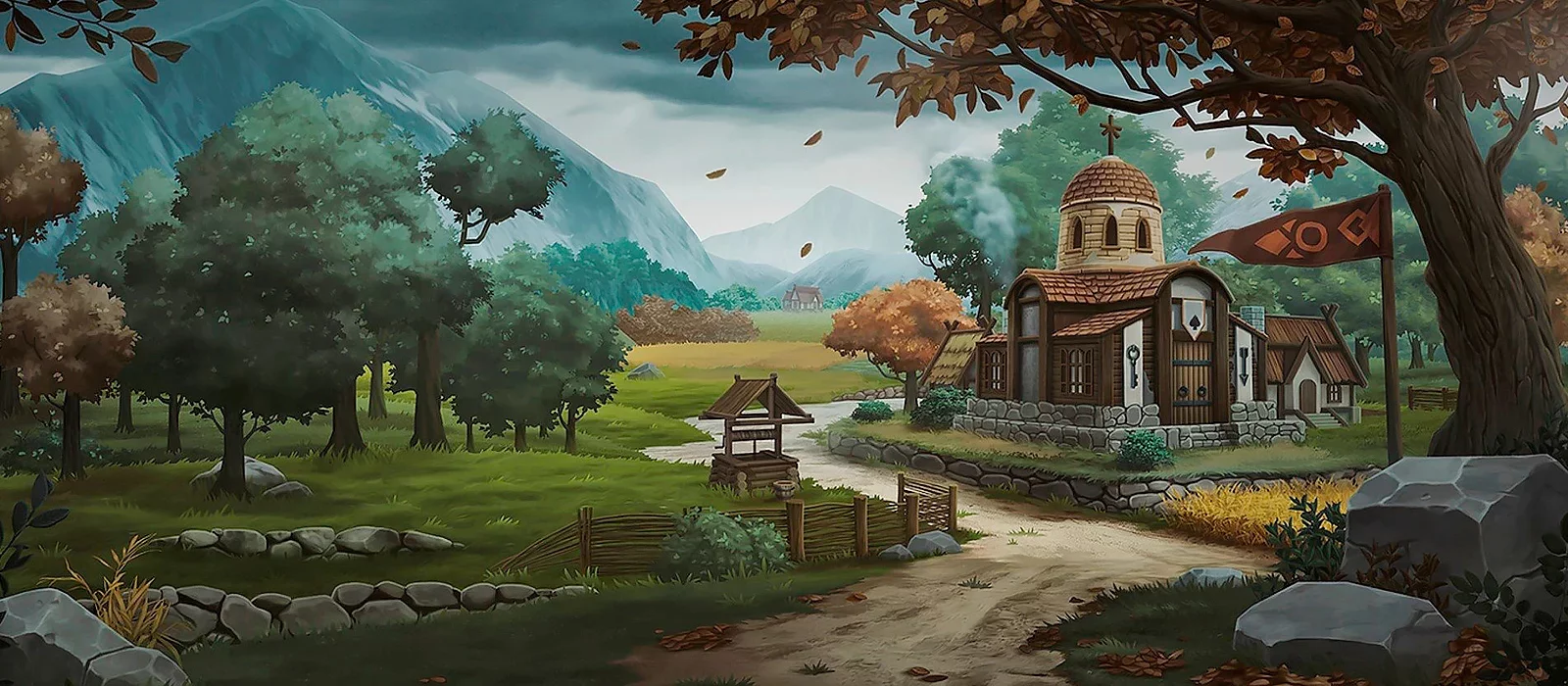
Norland creates the impression of a medieval The Sims about the adventures of mighty boyars with elements of city-building and economic strategy mechanics. This is partly true, but merely focusing on characters and their desires will inevitably lead the entire campaign to collapse. However, the journey from a simple noble family to royal status and the creation of an Empire full of wealth and power will be long and challenging. How to achieve this — we explain in the guide!
What is the game about?
First of all, let's note that Norland tries to be trickier than other modern projects by incorporating numerous mechanics, activities, and tasks. In early access, all this resembles a hodgepodge, and bugs also make themselves known. Therefore, we will first explain what is needed for what, who is responsible for what, who to appoint where, and then talk about a quick start and specific nuances of the game.
The action in Norland takes place in real-time on two levels:
- tactical, where your settlement and surroundings are located, rich in useful resources — wood, iron, fertile land, and which you are free to fully manage. Battles also take place here if your city is attacked (battles with other armies occur on a similar map, just without the city).
- global, where your province is one of many others. Each province has a set of starting resources and a couple of helper villages producing a small amount of useful raw materials. There are also landowners — other noble families who also strive for success and will be your enemies or allies on this path. Actions here are of a command nature; you cannot directly control them.
The gameplay base is intricate. There is a simulation of residents and an employment system, but without specializations: any resident can forge, craft, and plant potatoes. There is a logistics system: peasants deliver goods to enterprises and return the final product to the market or warehouse, from where other workers can take them. And there are lords — nobles whom you personally manage each as a separate unit in some wargame. Let's break down the functions of each side.
The primary task of the lords is to study new knowledge in the Library. Without knowledge, you will not be able to develop properly, making them a key asset in the game. Possessing knowledge, lords manage farms, workshops, productions, etc., by giving instructions to peasants and workers. Only lords can engage in foreign policy (through the king), establish trade, and improve relations between noble houses.
Additionally, nobles are endowed with a kind of «free will»: they go where they want and do what they want, they have their own needs and thoughts, which makes the gameplay less predictable and also similar to The Sims. Try to fulfill their wishes.
Peasants — the main workforce, are engaged in fields, factories, and workshops. Peasants have two needs — food and drink, and they are ready to consume the simplest products as long as they earn enough money. You pay them every evening, but a lot of it comes back through the sale of products. Also, if you mistreat peasants too much, they may flee from the city.
Warriors — in peacetime perform police functions, and when gathering an army become swordsmen or archers. Warriors can be recruited from peasants (very weak guys), from mercenaries (already stronger), and later you can requisition knights (the strongest, although in the early version there were no horses). You do not manage them personally. Their equipment is your headache. You also pay a tax for each warrior for each day of service, and the better the warrior, the more you have to pay. It makes sense to recruit peasants, train them for a long time (you need a skilled commander), and equip them with the surplus of your producing economy.
Prisoners — free labor force, will work in fields and factories like peasants, but you don't pay them for their work. You capture them in battles from wounded but not killed enemy soldiers. During work and on the way to the barracks, they must be guarded by warriors; otherwise, if in good health, prisoners will try to escape.
As for the gameplay, there are many mechanics in Norland, you will have to deal with a little bit of everything, so let's highlight the key activities:
Relationships between lords depend on the frequency and quality of their communication. If the meeting went well, lords will cheer each other up, exchange thoughts, or even teach each other something useful. If the communication was unsuccessful, one lord may laugh at another, which will worsen their relationship and the latter's mood. With rare meetings, one of the lords may spread dirty rumors and offensive jokes about another.
If spouses spend little time together, they may fall in love with someone else. Unhappy lords poorly study knowledge, rarely give instructions, and may fall into depression. In particularly neglected cases, this will lead to arson, robbery, murder, or rebellion. Discord among lords can seriously slow down development: instead of managing the city and voyaging to neighbors, they will be engaged in personal conflicts.
City building. Regardless of your location and starting resources, your subordinates need food, housing, work, and spiritual development. Therefore, you will have to deal with the city: building houses, temples, farms, markets, and enterprises for processing raw materials into useful things for the same army.
Economic development. Growing plants and producing goods are not ends in themselves. It is important to establish trade relations, buying raw materials cheaply and selling finished products at a high price. The resulting difference settles in the city's treasury, and it is wise to invest the freed-up funds in the army, politics, or city infrastructure.
Politics and relations with neighbors. An important part of the game is diplomacy. You will have to visit neighboring countries, give gifts, buy grooms or brides, and also send troops to help against barbarians, bandits, and rebellious princes. In turn, reliable friends and loyal allies will help you in difficult times — when there is not enough money or enemies attack.
Creating a state. Your main goal in the game is to develop so much that you can subdue 12 provinces by force of arms or economic influence. There is also a crisis option, where you will have to defeat the Unholy Horde or the Inquisition troops of the local Matriarch. Yes, in the game there is an option to try to capture neighbors from the first minute and live off the tribute received from them, but this is risky — one mistake and everything will fall apart.
Creating a new game
Norland, already in early access, offered an extensive editor for creating a new game, including setting up a noble family, choosing a location on the global map, starting resources, and scenarios. However, the tutorial skips these stages and immediately moves on to managing lords, the city, and then to diplomacy, war, and trade.
We recommend first creating a new game and then going through the tutorial. The editor is simple and clear, even for beginners, and will make many aspects of the tutorial (what kind of family, character parameters, their attachments and inclinations, why my city is here and not there, etc.) much easier. After completion, you can continue the scenario from the tutorial (the starting conditions on the map are slightly more favorable) or return to the game created earlier according to your preferences.
And now it's time for other key settings. The first game in Norland is best played on the principles of good neighborliness and trade, at least in the early stages and mid-game. The optimal starting position is the center of the map; choose «Vorongrad» or «Iskrograd» and click «Next.»
Now you are in the customization menu, where you can detail the attributes and province of your faction, as well as neighboring territories. Choose hops and wheat or turnips and wheat as the tribute paid by your villages. Growing these crops at the start will require too much investment and can easily undermine your not yet very strong economy, any relief will be beneficial.
Then set up the goods your neighbors will sell. Usually, you can choose one item, while the second is often locked due to the region's features and balance. The best goods to start trading are flour, moonshine, beer, and aromatic ale. They have a short production cycle and affordable resources. Keep in mind that relationships are easier to build with neighbors of the same culture as you. If at the beginning of the game you find yourself surrounded by neighbors of a different culture, this can become a serious obstacle.
Other game parameters:
- Without a starting scenario;
- Modifiers: longevity and iron surplus;
- Crisis: yes or no, optional;
- Difficulty: normal;
- Gold: 3000.
Quick start in Norland
As in most strategies, the correct sequence of actions in the first few hours is key. Let's try to describe the order of steps for a good start in the early version of Norland. Don't forget to save after starting the game. Also, perform all actions while paused:
Study the tactical map. Determine the location of the city center and the direction of its development. Pay attention to the location of resources and raw materials to plan further expansion.
Rearrange buildings. At the start, buildings are not always placed optimally. Place the lords' houses, library, peasants' dormitories, and future resource extraction sites closer to each other. Structure with an eye on the appearance of new buildings in the future. Note that when placing buildings, the game automatically cuts down trees, and you will not receive the due resource.
Build roads. Don't be afraid to spend gold on road construction — they significantly speed up NPC movement, which is important given the multitude of activities for lords and peasants. Additionally, roads will act as lines on the board, allowing you to better plan the city. Mastering this tool on the first try might be difficult, so we recommend saving first, fiddling with the layout, and then reloading to do everything cleanly.
Build necessary buildings. At the beginning of the game, build in the following order: 2 sawmills (and immediately upgrade them to the second level), a mill, a brewery (for moonshine, beer, and ale), an altar, and a second dormitory. Approximately as shown in the screenshot.
Open the knowledge menu. Check the available books and send the smartest lord to study one of them, preferably something useful for trade, such as the mill or brewery.
Assess the strategic map. Identify neighboring provinces, what they sell and what they are willing to buy, find the best trade options, choose at least three in the order #1-#2-#3, and prepare to start trading with them.
Improve relations with neighbors. Send the king (the main lord) to improve relations with the leader of neighboring province #1. If you deem it necessary, you can also start with province #2 immediately. Keep in mind that lords spend a lot of time traveling, and if possible, it's better to handle several tasks at once.
Give orders. Send the last, third lord to give orders to the existing buildings. Orders last for several days, but lords try to renew them every morning if they are satisfied and not hungry. As soon as this lord is free, send him to study another book.
Now the main actions are complete. Take the game off pause and watch as the characters start performing their tasks and the peasants start building. Set the priority on building and upgrading sawmills, as wood is the main resource in Norland. The faster it starts coming in, the better.
Keep in mind that city residents will find jobs themselves. You don't need to direct them to specific positions, but you can regulate the number of workers when there are not enough for key buildings. Use the switch:
Usually, peasants distribute resources to the buildings under construction evenly, but some objects, such as lords' houses and temples, have higher priority by default. You can set the priority for construction or upgrading by checking the corresponding box in the building's menu. However, stick to the rule of one priority building or upgrade at a time, otherwise, the mechanic won't work properly.
What knowledge to learn at the beginning of Norland?
Knowledge is the most important part of progress in Norland: it allows you to build new buildings, upgrade them, open new opportunities for characters, and generally expand the gameplay. Knowledge is studied in the library through books that, conditionally, are stored there. All books are purchased from the merchant, but he brings them irregularly, and each time different ones, so at the beginning of the game it is advisable to buy only the necessary ones and sell already studied ones.
Knowledge is distributed by levels, which are easily determined by the color of the book covers. Brown denotes common knowledge, green — rare, purple — very rare. The higher the level of knowledge, the more time it will take for the lord to study it, which is directly influenced by the «Intelligence» attribute of each noble. A character with high intelligence can master a simple book in an evening, while rare, and therefore complex, knowledge will require several in-game days. If the character's intelligence is not high enough, he will not be able to start reading at all.
To make life not seem like honey, books and lords are divided by languages. If a book is written in a language that your lords do not know, they will not be able to read it. There is a function for creating a copy of the book: a lord who knows the required language can make a translation, and then another lord with sufficient intelligence can study it. However, copying requires expensive paper, and this is a mid-game mechanic and beyond. At the beginning, just make sure that the language of the book matches the language of your faction.
When knowledge is studied by one lord, it can be used by all. However, if he dies of old age or perishes in battle, the knowledge will be lost, and it will have to be studied again. You will not be able to build new buildings but will continue to operate them. There is a chance to pass the knowledge to other lords during communication or training of juniors by seniors, which can extend its availability for the entire party.
Therefore, you cannot assign one lord to be responsible for all knowledge — distribute tasks taking into account the abilities of each character. Even if a character does not have high intelligence, let him read simple books and improve the skill — this will make him more useful in the long term.
The very process of studying knowledge can become a challenge to your skills if the lord keeps disappearing — either at war, on leave, or overloaded with managerial duties. It is impossible to transfer the study of a book; you can only start over with another lord.
And here lies the trap: another lord might also enter a period of extreme busyness, leading to stagnation in studying. If this knowledge is secondary, you can wait. In the early version of the game, there are critically important pieces of knowledge, delays in studying which can lead to significant progress delays. Ensure the study of the coal furnace, workshop, and finally, the chancellery.
General production tips
Upgrading existing buildings is usually more effective than building new ones — it yields more resources. Therefore, first and foremost, strive to upgrade already built buildings. The exceptions are sawmills and breweries. On days 12-15, you will need 3 second-level sawmills. If the population exceeds 50 people, you need to have 2 third-level breweries. The iron mine is recommended to be upgraded to the third level by day 20. Raising the level of these structures further is inefficient, at least until the endgame begins.
Producing goods in Norland is not as simple as it seems at first glance. To do this:
- buy a book with the description of the needed good from the Merchant;
- study the knowledge in the Library;
- build the corresponding building — after this, a new column for this good will appear in the «Production» section;
- provide the building with raw materials and labor to start producing the good.
Consider the feature of the «Production» menu. The game strives to automatically enable the «produce up to N» mode, for example, up to 30 units of tools, with tracking of the produced quantity. As soon as the set quantity is reached, production will stop, and the workshop will cease operations. To prevent this from happening with important resources, we advise setting the mode to «make up to N», so that stocks are replenished constantly.
Agriculture and food
Norland strongly recommends engaging in the cultivation of grains and turnips as quickly as possible, but don't rush. Usually, the game starts with a set of initial resources, like the same flour and moonshine, in an amount sufficient for 3-4 in-game days (don't even think about selling these stocks). After 4 days, the surrounding villages will bring tribute, providing your city with another day or two of peaceful life.
Do not rush to plow many fields, because each one requires 80-160 units of wood just for construction and another half of this amount to restore soil fertility after 5 harvest cycles. First, address the priority issues, and then, one per day, engage in creating fields. Keep in mind that any large construction, or several at once, disperses the consumption of resources, labor, and time. If you start building many fields at once, peasants will continuously carry wood to the fields, but none of them will be completed (for example, 58/80, 99/160, 125/160, 158/160). As a result, the wood will simply accumulate in the fields.
Your task is to always have the ability to maneuver resources, having wood reserves for other buildings or upgrades.
To meet the basic food needs of the city, you will need 4 fields: 3 for rye (flour) and 1 for turnips (moonshine). The turnip field can be a priority since it is cheaper and will allow you to start moonshine production faster. After this, engage in growing rye.
The produced resources are sent to the warehouse, from where they are distributed to the markets in your settlement. The market is a key place for peasants, where they buy food and drinks with their earned money. Lords receive the necessary goods directly from the warehouse, not participating in this mechanic. You can prohibit the sale of certain goods at the market, for example, ale and meat, to save them for the lords.
For peasants, it is important to maintain a balance between earned and spent money. For example, a peasant earned 10 gold in a day, and he can spend 5 on flour and 5 on beer. If he earned only 8, he can only buy flour, and beer — the next day. Or he will buy turnips and moonshine, and keep 2 gold for himself. You can set a salary with a bonus of 1-2 gold so that peasants can eat and drink more often, maintaining their mood and productivity.
First purchases from the Merchant. Recruitment of free lords
In the evening of the first day, an independent Merchant and a free lord, who can be hired, will arrive. The Merchant will take a place in the center of the city at 21:00, save the game at 17:00. This is needed in case the merchant turns out to be high-level, and the lord unsuitable — just load the save. Buy all common rarity books from the Merchant, as well as sacred rings.
Hire the free lord — ideally, it should be a man with high intelligence, management, or trade stats. This lord will mainly deal with internal affairs: studying new knowledge, buying and selling from the Merchant when he comes to the settlement, and, of course, giving instructions. Later, he will sit in the chancellery and manage clerks who give instructions. I was lucky to get such a lord on the first try.
Usually, a free lord is hired for 10 days, and his services require a noticeable amount of sacred rings, but the first hire has a 50% discount. The main thing is not to forget to then accept the new noble into the family — for this, his relationship level with the King should be no lower than +25, which can be achieved through communication and joint hunting.
With the second free lord, everything is simpler. I chose a female commander as a wife for the second lord (the King's brother). Until mid-game, she mainly dealt with giving instructions until I started creating an army. In general, until the endgame, you will have the opportunity to accept three more lords into the family, which will significantly ease the management of many buildings.
How to improve relations with neighbors
On the first night, the King should return from a diplomatic mission to neighboring provinces. On the morning of the second day, send his brother, the merchant, to conclude trade agreements: start by buying raw materials for further processing, but you can also immediately agree on the sale of finished goods. By this time, you should have already determined what you will produce and where to sell it.
Maintain this practice: first, one brother establishes or strengthens relationships, then the second improves them through trade. Relationships with neighbors can also improve through marriages, loans, credit repayments, assistance in war, or support in internal political conflicts. Refusal to participate in events such as the overthrow of a legitimate ruler or untimely sending of assistance (money, troops) will almost certainly lead to deteriorating relations, if not the breaking of trade agreements.
How is the symbiosis of foreign policy and trade organized? Suppose your neighbor on the right sells wood and buys flour. The neighbor on the left sells hops and buys heavy armor. Another neighbor sells rye and buys fragrant ale. The task is as follows: process hops and rye into beer and flour, and using internal resources — produce ale from hops and medicinal herbs. The excess wood can be used to produce charcoal, which is then combined with smelted ore to create heavy armor.
Sometimes, supporting allies does not require a large army. It is enough to gather your lords and send them as reinforcements. In real combat, they can intervene in an ongoing melee as «fresh blood» or perform an important tactical action — attack enemy archers/throwers. It won't hurt to take down one of the enemy commanding lords, for which neighbors might even reward you, although the main burden of the battle will remain on their shoulders.
Another interesting point is joining someone else's alliance. This is not as bad as it might seem, although the game will stubbornly encourage you to create your own state. While you are focused on developing the economy and production, your own foreign policy may take a back seat. Joining an alliance will allow you to expand trade with allies, bringing in more income. More money — more peasants and workers — wider trade — better overall results. And in the future, when your influence grows, you can reform the alliance with yourself as the leader.
***
Maintain a balance between diplomacy, trade, and military affairs to strengthen your kingdom. Keep an eye on relations with neighbors, join alliances, and involve lords in important events so that they become true pillars of your power. By adhering to these principles, you will be able to create a powerful and prosperous kingdom in Norland!
Other guides
- Guide: How to Earn Gold in Norland and Where to Find Sacred Rings
- Guide: How to Create a Noble Family of Lords in Norland
- Leitfaden: Wie man eine Adelsfamilie von Lords in Norland gründet
- Leitfaden: Wie man Gold in Norland verdient und wo man heilige Ringe findet
- Max ist zurück: Eine halbe Stunde Life is Strange: Double Exposure Gameplay
